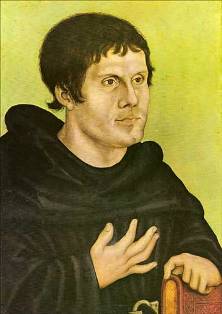In honor of the works of Martin Luther and the beginning of the Protestant Reformation on this date almost 500 years ago, I've posted the first ten of the articles he nailed to the door of the Church at Wittenberg. I doubt he knew how great an impact those 95 articles of contention would make. Every Christian church today that is not Roman Catholic was born out of those 95 theses. I've tacked on a little bit of his story below.
Little Bits of History95 Theses
October 31, 1517: Martin Luther posts his “Disputation” on the Castle Church in Wittenberg. “Disputation of Martin Luther on the Power and Efficacy of Indulgences” was written in Latin and posted on the door as was the custom of the time at the university. On this same day, a hand-written copy was sent to the archbishop, Albert of Mainz and Magdeburg. This included “honorable” comments concerning the practice of selling indulgences – something the bishop was wont to do. Another copy was sent to the bishop of Brandenburg who was Luther’s immediate superior. It took weeks for copies of the 95 Theses, as it was called, to spread across Germany and another two months for the disputation to reach all of Europe.
It wasn’t until January 1518 that the work was translated by Luther’s friends into German. Then using the relatively new printing press, copies were made and the controversy began in earnest. Luther was adamantly against the selling of indulgences, or the forgiveness of sins. At the time there was a saying that “As soon as the coin in the coffer rings, the soul from purgatory into heaven springs.” Luther maintained that God alone was capable of granting forgiveness and wished to see Christians return to more theologically sound practices. On June 15, 1520, Pope Leo X responded by issuing a rebuttal with the English translated title of “Arise, O Lord” and he outlined where he thought Luther was in error. Luther’s Theses became a declaration of independence of Northern Europe wishing freedom from Papal authority. This was the beginning of the Catholic Church’s loss of power over much of Europe as well as the decline of feudalism and the rise of commercialism. Some of these social changes may have happened without the break from the Church, but with one type of freedom, another was easier to achieve. In 1517, Luther was 34 years old and he lived to the age of 62. He was a respected theologian and had no plan to break from the church in which he practiced his faith. However, he became an iconic figure of the Protestant Reformation and maintained throughout his life that buying salvation with cash was against doctrinal preaching. He was adamant about salvation coming via grace through faith in Jesus Christ. He also believed that the Word of God should be accessible to more people and translated the Bible into the vernacular rather than keeping it in the esoteric Latin of the Church. His hymns brought singing into churches and his marriage to Katharina von Bora set an example of married clergy. Luther was excommunicated by the Pope and condemned as a outlaw by the Holy Roman Emperor when he refused to retract his 95 Theses at the Diet of Worms in 1521. All who call on God in true faith, earnestly from the heart, will certainly be heard, and will receive what they have asked and desired. | |||||||

